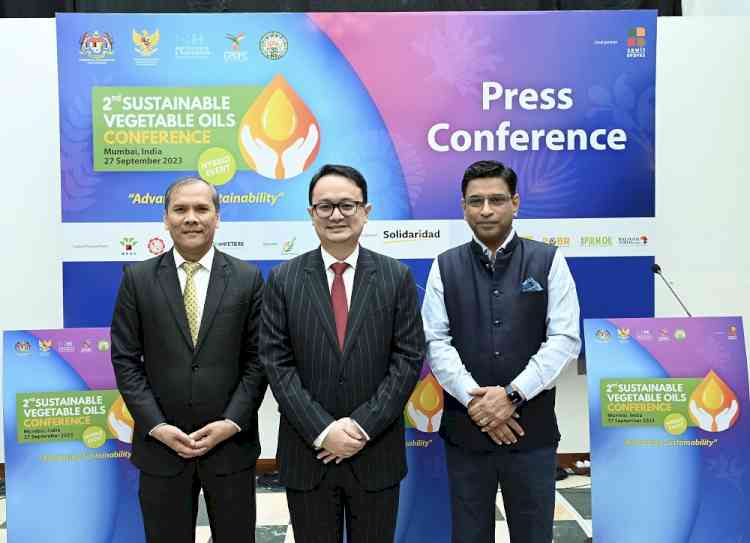 Left to Right – Ybhg Dato’ Mad Zaidi Mohd Karli, Secretary General of Plantation and Commodities, Ministry of Plantation and Commodities of Malaysia; H.E. Jerry Sambuaga, Vice Minister of Trade, The Republic of Indonesia; Dr. Shatadru Chattopadhayay, Managing Director of Solidaridad Asia during the 2nd Sustainable Vegetable Oils Conference in Mumbai
Left to Right – Ybhg Dato’ Mad Zaidi Mohd Karli, Secretary General of Plantation and Commodities, Ministry of Plantation and Commodities of Malaysia; H.E. Jerry Sambuaga, Vice Minister of Trade, The Republic of Indonesia; Dr. Shatadru Chattopadhayay, Managing Director of Solidaridad Asia during the 2nd Sustainable Vegetable Oils Conference in Mumbai
Mumbai, India, 27 September 2023, Vegetable oils, the fastest-growing food commodity, continue facing an ongoing challenge of meeting the escalating high demand that increasingly outstrips supply. The climate change impacts and geopolitical development pose main challenges that require collaboration and partnership among the producers to mitigate potential supply constraints that potentially disrupt the food and energy security.
The Council of Palm Oil Producing Countries (CPOPC) and Indonesian Palm Oil Association (GAPKI) co-organised the 2nd Sustainable Vegetable Oils Conference (2nd SVOC) to address immediate challenges and to deliberate measures to enhance future resilience in providing sustainable vegetable oils. Taking place in Mumbai, India, so we want to align with the G20 on highlighting India as a major consuming country to strengthen cooperation on sustainability, food and energy security, renewable energy, resilience and inclusive food value chains, and circular economy.
The leading vegetable oils stakeholders discussed the global challenges in the vegetable oils supply chain and highlighted the important of strengthening the foundation for future communication and cooperation among global stakeholders, fostering an alliance for common interests in the vegetable oils sector.
The agricultural and commodity representatives of the main producing countries (Indonesia, Malaysia, India, China, and the EU), representatives of international organizations (i.e., Food and Agriculture Organization and Intergovernmental Panel on Climate Change) and major multinationals, as well as growers, discussed the pivotal role of vegetable oils which is to be emphasized as a fundamental tool to humanity, both for edible consumption and various applications, including in achieving the United Nations Sustainable Development Goals (SDGs).
The Minister of Agriculture and Livestock of Honduras, Dr. Laura Suazo, expressed her concern on the challenges faced by Honduran small producers and extraction plants due to the recent changes of EU’s import policy. She announded the government’s plan to launch the State Policy for the Agri-Food Sector of Honduras 2023-2043 which proposes several strategies including to address the management of pests and diseases, land invasions, genetic improvement and financing.
The Vice Minister of Trade of the Republic of Indonesia, Dr. Jerry Sambuaga, reiterated today’s conference notes, “Advancing Sustainability”, that has two important aspects concerning palm oil and its global contribution. First palm oil can fulfil the global demand of sustainable vegetable oil, but exploitation of palm oil negative image must stop. Second, palm oil and SDGs are inseparable, as the former underpins the attainment of the latter.
The Secretary General Ministry of Plantation & Commodities of Malaysia, Dato’ Hj. Mad Zaidi bin Mohd Karli, underscored the world population that is growing steadily, and the world is under pressure to meet global demands for food and fuel. So, the key question that is needed to confront is not about replacing palm oil, but rather acknowledging how sustainable palm oil can meet this demand efficiently, economically, and sustainably. Palm oil has proven to give positive impacts on global food security stems from its high productivity, wide range of applications, and ability to enhance food security.
Dr Shatadru Chattopadhayay Managing Director Solidaridad Asia said that “Solidaridad urges the EU that for inclusive implementation of the EU Deforestation Regulation, it is necessary to create three things: First, implement an inclusivity quota, guaranteeing a specific percentage of palm oil imports from smallholders in Indonesia and Malaysia. Second, support oil palm smallholders by providing pre-financing, technical assistance, and a guaranteed market for carbon credits. Third, support aligning national mandatory sustainability standards like the Malaysian Sustainable Palm Oil (MSPO) and the Indonesian Sustainable Palm Oil (ISPO) with the EUDR”.
The Secretary General of CPOPC, Dr. Rizal Affandi Lukman, recalled the role of palm oil to provide new and innovative approaches, ideas and measures to ensure the resilience and prosperity of the global vegetable oil sector in the longer term. he emphasized that for major consumer like India, palm oil is to complement the domestically produced vegetable oils, not as a competitor, to ensure food security and energy security. Without a doubt, palm oil is a crucial feedstock in the renewable energy mix, with the potential to play a pivotal role in supporting the implementation of the Global Biofuel Alliance, established during the 2023 G20 summit